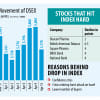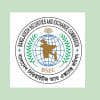Disinformation is a destabilising force for the capital market

Disinformation can be defined as proven false information that is created and disseminated with the intent to deceive, while misinformation is inaccurate information given without malice. Distorted information, whether misinformation or disinformation, is a pivotal factor in today's financial landscape.
An article on an Indian news platform boldly stated on May 14 that hackers from their own country were likely responsible for the hacking of billions of dollars from the Bangladesh Bank reserves this month. The report claimed to be a follow-up on the investigation of the incident, stating that security agencies of both Bangladesh and India were investigating the massive digital theft.
The heading and the report were written in a way that struck the relevant financial stakeholders in Bangladesh like a thunderbolt. This happened at a time when the country's stock market was already in a volatile position due to several issues, including an increase in the central bank policy rate, the introduction of a six-month moving average rate of the treasury bill to make the interest rate of lending competitive, the introduction of a crawling peg in determining the exchange rate of foreign currency, and the probable withdrawal of the waiver in capital gain taxes.
The increase in the central bank policy rate makes borrowing from the central bank costlier for commercial banks by raising the cost of funds. Simultaneously, making the lending rate of commercial banks competitive forces lending to brokerage houses and merchant banks to become more expensive.
A significant number of foreign investors quit the Bangladesh stock market after the dollar price started to increase in early 2022. Typically, an increase in the dollar price encourages foreign investors to bring more investments, as it allows them to convert their home currency into a larger volume of local currency, enabling them to purchase a larger volume of stocks. However, in this case, the fear of further devaluation of the local currency caused them to wait. At the same time, existing foreign investors were losing money when they tried to repatriate their investments, as the local currency's depreciation reduced the amount of foreign cash they had originally invested.
On May 8 this year, the central bank introduced a Crawling Peg Exchange Rate System for spot purchases and sales of US dollars, setting a Crawling Peg Mid-Rate (CPMR) at Tk 117 per US dollar. Scheduled banks may purchase and sell US dollars freely around the CPMR with their customers and in interbank deals. The jump in the dollar rate from Tk 110 to Tk 117 caused panic among local investors in the stock market, fearing more disinvestment by foreign investors as experienced before.
To mitigate the longstanding foreign exchange crisis, the International Monetary Fund (IMF) extended their loan support on the condition of complying with some reform strategies in the financial sector, one of which is the withdrawal of concessions on income tax, VAT, and tariff. A Statutory Regulatory Order (SRO) dated July 1, 2015, granted individual investors an exemption from paying capital gains tax on listed stocks, mutual funds, bonds, and debentures. To comply with the conditions given by the IMF, there was a buzz in the market that the National Board of Revenue (NBR) was planning to withdraw the exemption of the capital gain tax facility from the next fiscal year, which has already been proposed in the national budget of FY 24-25.
All these factors contributed to the decline of the stock market index. Following this, the disinformation about the central bank reserve heist emerged with malicious intent to further deteriorate the market condition, forcing marginal investors to sell their portfolios at a lower price.
The news was published on a low-profile Indian news portal which was registered on November 26, 2022—a registration that is set to expire on November 26, 2024. The portal, with only 6.3k followers, clearly lacks the credibility to be making such sensitive financial claims.
Any reduction in forex reserves pushes the dollar price up. In the context of the current deteriorating situation in the stock market, this disinformation about the reserve heist acted like the addition of fuel to a fire.
Misinformation or disinformation have been found to increase abnormal stock trading activity and stock price volatility by more than 50 percent and 40 percent respectively in the United States, according to research published in 2019. Research from 2020 suggests that they can also be used to promote specific stocks, resulting in speculative trading campaigns. There has yet to be a study for the Bangladesh market determining the volatility rate caused by different forms of misinformation or disinformation. A survey in 2012 found that 15.79 percent of respondents believed that price fluctuations in the Bangladesh stock market were due to the spreading of fake news. This report, however, does not include the quantitative outcome of volatility caused by misinformation or disinformation. A 2023 study revealed that stock prices of targeted firms respond to fake news even if its informational content is non-existent. Negative false news items have significant short-term negative effects on returns in the US and European markets.
Misinformation and disinformation pose significant risks to the financial sector. Key risks include market volatility, stock price fluctuations, panic selling, poor investment choices, erosion of trust, economic slowdown, operational risk, reputation damage, compliance complexity, policy missteps, increased scrutiny, and higher costs. Addressing these risks requires a coordinated approach involving fact-checking and verification processes, enhancing media literacy, regulatory measures, public education, and technological collaboration.
Mohammad Jahidur Rahman is adjunct research fellow at the Center for Critical and Qualitative Studies, University of Liberal Arts Bangladesh. He can be reached at [email protected]
Views expressed in this article are the author's own.
Follow The Daily Star Opinion on Facebook for the latest opinions, commentaries and analyses by experts and professionals. To contribute your article or letter to The Daily Star Opinion, see our guidelines for submission.

 For all latest news, follow The Daily Star's Google News channel.
For all latest news, follow The Daily Star's Google News channel. 









Comments